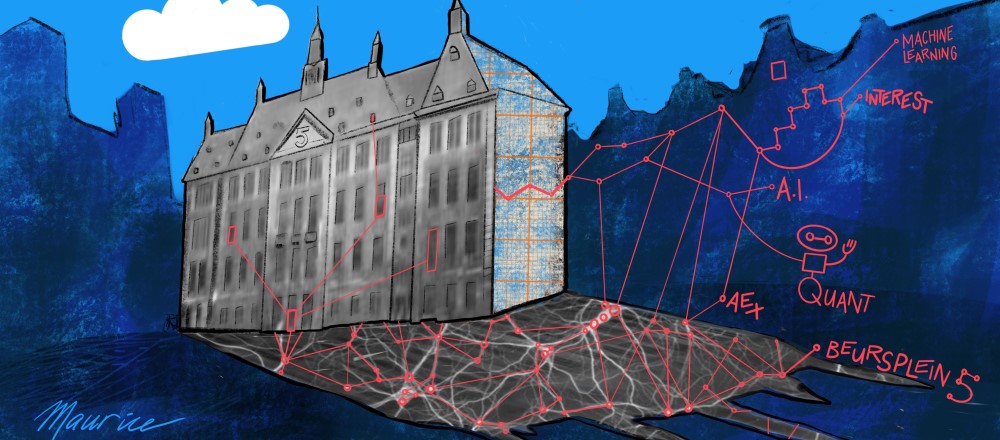Some time ago I saw an interview with successful contemporary artist Erik van Lieshout in the Zomergasten (summer guests) series on Dutch television. Interviewer Jelle Brandt Corstius had a whole evening conversation live with the artist, exploring several elements of the artists life, work, experiences and insights. At some point they truly lost each other in the conversation, and I was sitting in front of the TV frustrated by the interesting topic that was now completely lost. Actually it was the frustration of seeing an autistic artist and an opinionated interviewer wasting such a great topic. The artist described things that would happen, and that I very much recognise from making art myself. Also I had several artists telling me they recognised the experience
link to the site with all elements of the interview.
Interview
In the interview the artist explained that sometimes he would work intensely on an art work for hours and hours, it would feel amazing and everything would feel like 'just happening by itself'. Every brush stroke would feel great and he would lose track of time while enjoying the flow. After that he would go home and later return with his wife. And at that time he would discover the painting was complete crap, horrible, a disaster...
The interviewer asked about the influence of the artists wife and completely got lost in trying to understand how it was that his wife had such an impact. While the artist failed to understand why the interviewer just didn't understand that it was not about his wife, but about the different view you can have while being in the flow and afterwards. And how sometimes being in a flow you start to fly but lose connection with your own reality.
Experience making portraits
 |
| Is this a nice portrait...or would we need to know whether it resembles the model made it with Omnisketch app |
Interesting is the process of making a portrait, and especially emotions while making them. There are times when it is a struggle to create the portrait, actively observing the shapes, feeling the person, looking for the characteristics. At times from the start the drawing seems not to resemble the person, so you keep observing, trying to figure out what's wrong, continuing to detail and finally -with a big sigh - complete the portrait.
At other times the first lines I draw already show the person, and everything goes easily, adding more and more and in a relaxed way, actually knowing this will be a great portrait.
During my first experiences my brother was quite key; he would be brutally honest. It was tough at times, but it was also nice if he liked it, because he would not say that to please me.
And often - going against what I felt just after making the portrait - the easily made drawings were judged as 'horrible', 'who did you actually draw' and 'just throw it away and try again'.
While the ones I thought were product of a burdensome process were often very much liked, and really considered to show strong resemblance.
Related management observations
It might seem funny to you, but this 'experience' actually reminds me of team meetings where I did a monthly update for some 40 employees. I would normally present large part of those meetings and with my team leaders we had developed the practice of evaluating each time, which proved quite fruitful.
There would be meetings that would flow easily, the topic was clear to all, I was funny and bringing interesting information to the team. No tough questions and all quick and smooth.
Other meetings were tough, many questions of resistance, challenging me, difficult to get to the end and meeting proving to be longer than planned.
In the evaluation often the burdensome meetings seemed to be fruitful and I would receive positive feedback.
But after the meetings that seemed smooth and easy I was most of the times getting dramatic feedback (of course the team leaders would be polite, but I know feedback when I get it).
I guess that when it went easy I would go on the 'automatic pilot' and stop observing and interacting with the group; just delivering information and enjoying the flow.
Conclusions ?
A few conclusions or insights I would take from these examples and related experiences, knowing that this is not a true scientific analysis.
Whether it is painting or leadership situations - you have to fully engage to get the true results. In art there is an expression that 'true art scratches the soul of the artist'.
In meetings I now sometimes invite people to ask tough questions when things go too smooth. And when too much in flow while making art I create disruption (or look for pain within me) when drawings go too easily.
I also found it truly important to collect people around me that are brutally honest about what we do, passionate enough to care and not afraid to hurt others while searching for the best way forward.
And on a similar note I would like to share a view, having reflected on management in several sessions and contexts. There are quite some managers that feel that 'management is easy' and that they 'will tell the team how things work'. Well...I have observed in that case that many aspects and depths of management are overlooked and/or people are just disconnected and delivering their own view to others, so I would say:
whenever a manager tells you that management is 'easy'... they have no clue of what management is about.

No comments:
Post a Comment